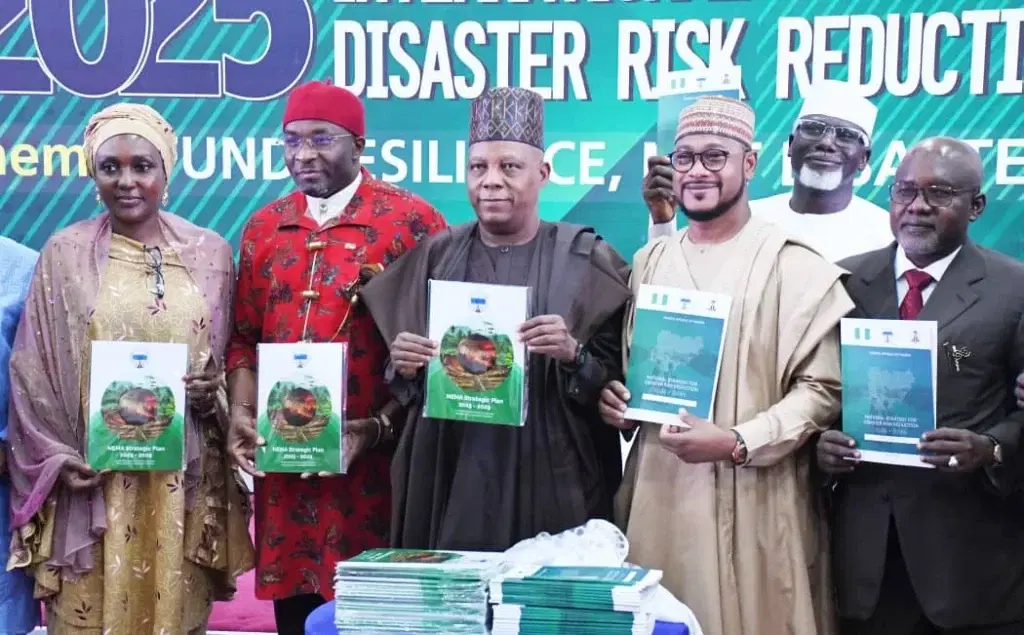Vice-President Kashim Shettima says President Bola Tinubu’s administration is developing a National Disaster Risk Financing Framework to guarantee timely funding for prevention and preparedness.
Shettima said this at the 2025 International Day for Disaster Risk Reduction (IDDRR) themed ‘Fund Resilience, Not Disasters’, organised by the National Emergency Management Agency (NEMA), held on Monday in Abuja.
He also said that the administration was deepening partnerships with development partners, the private sector, and research institutions to drive innovation and resilience building at all levels.
” If we fail to invest in resilience, we will continue to spend our scarce resources cleaning up after crises instead of building lasting prosperity.
“President Bola Tinubu emphasises this need to treat resilience as a national policy.
” We are integrating disaster risk reduction into every sector—from agriculture and infrastructure to education and health.
“This is as we are expanding early warning systems to ensure that communities receive timely alerts before floods, droughts, or disease outbreaks occur.
” We are strengthening state and local emergency management agencies through training, technology, and coordination support, ” the vice-president said.
Shettima, however, said that commitment alone was not enough, adding, ” We must match our words with action and our policies with funding.
“To fund resilience is to invest in drainage systems, not relief camps; to build stronger schools and hospitals, not temporary shelters.
“Asi, to support farmers with climate-smart tools, not just food aid after floods; and to train and equip our first responders before the sirens start to wail.
“This is the shift we must make—from reacting to crises to anticipating and preventing them.”
He stated that resilience cannot be guaranteed by government alone, saying, “It is built by all of us.
“It is reflected in how we plan our cities, in how businesses protect their workers, and in how communities share information and look out for one another.
“This is why our private sector must see itself as a partner in prevention, embedding risk reduction into corporate planning and investment decisions.”
Shettima said that academia and research institutions also bear the responsibility of helping the government generate the data, innovation, and practical research needed to prepare for a safer future.
“We count on them to shape the knowledge that guides our decisions. And we expect our civil society to hold us accountable, to raise awareness, and to mobilise citizens around the shared responsibility of preparedness.
“But none of these efforts will yield results unless we empower and support our communities to take ownership of their safety.
“They are the foundation of whatever strategy we adopt and the heartbeat of our national resilience.
“Distinguished ladies and gentlemen, the decades of disasters our nation and the world have endured must inspire us to move from sympathy after disasters to strategy before they happen.
“We must replace reaction with readiness and fear with foresight,” the vice-president said.
He commended NEMA, partners, and all who continue to play their role in keeping Nigerians safe and in building a nation that is ready—not just for today but for tomorrow.
The Minister of Humanitarian Affairs and Poverty Reduction, Mr Yusuf Sununu, highlighted the importance of disaster risk management in Nigeria.
He emphasised the need for a comprehensive and holistic approach to address the challenges posed by disasters.
According to him, Nigeria has suffered significantly from disasters, including flooding, drought, landslides, insurgency, and banditry, which have complicated humanitarian and poverty reduction efforts.
He stressed the need for a comprehensive and holistic approach to disaster risk management, involving all stakeholders.
Sununu also called for empowering local communities to prepare for and respond to disasters.
“A nation that cannot absorb shock and takes a longer time to recover will definitely have prosperity far from it.
“We need to reduce our reliance on external funding and look inward to reduce shortfalls and improve domestic mobilisation of funds,” he said.
The minister listed several government initiatives to address disaster risk management and poverty reduction, including the Conditional Cash Transfer programme, which had reached over N8.1 million households in Nigeria.
“There is also a plan to provide 21,000 Nigerians with interest-free and collateral-free loans of N300,000 each to support dry season farming and mitigate the effects of flooding,” he added.
The Director-General of NEMA, Mrs Zubaida Umar, called for increased funding for disaster risk management to build resilience in the country.
She emphasised the need for a proactive, preventive, and well-financed disaster risk management framework.
According to her, NEMA had developed two landmark policy instruments: the NEMA Strategy Plan (2025-2029) and the National Disaster Risk Reduction Strategy (2025-2030).
“Let us collectively rethink how we fund resilience; to move from reactive, ad-hoc funding of disasters to a multi-stakeholder financing architecture that supports prevention, preparedness, and sustainable recovery.
“Resilience must be mainstreamed across sectors from agriculture, water resources, energy and infrastructure to finance, education, and health,” she said.
The Country Director of PLAN International Nigeria, Dr Charles Usie, in a keynote address, highlighted key observations and recommendations for increasing disaster risk reduction funding in Nigeria.
He, however, called for increased transparency in disaster risk management.
Usie further cited limited accountability and disclosure in NEMA’s projects and funding.
He recommended improving data collection, management, and dissemination to design effective financial protocols and investment strategies.
The country director also advocated improved coordination among the stakeholders, with a clear segregation of roles and responsibilities.
“We are unable to continue to talk about increased funding where we have not been able to look at how to perform it as a way of performing it.
“NEMA must prioritise financial transparency by publishing their budgets, allocations, and expenditure details as much as possible, ” Usie urged.
NAN reports that by implementing the above recommendations, Nigeria can build a financial backbone necessary for lasting stability and protecting development gains.
The post FG designs national risk financing framework for disaster prevention – Shettima appeared first on Vanguard News.

